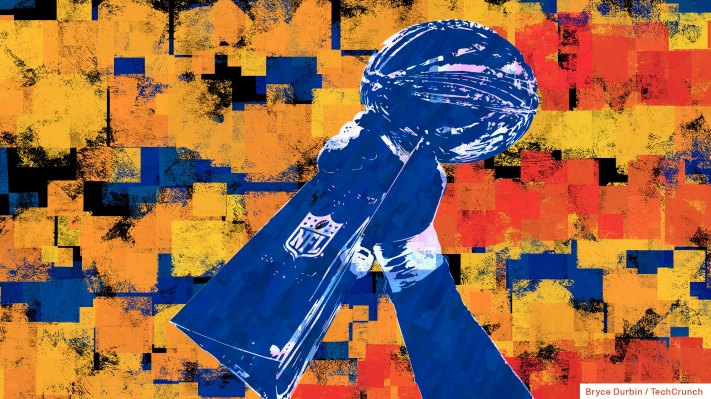Some people watch the Super Bowl for the actual football game being played. Many watch the event for the halftime show or as an excuse to eat wings and other game day snacks. Some watch it to look for better software solutions for their company — maybe?
Papaya Global hopes so. The late-stage global workforce payment startup is running a 30-second ad on Sunday. The ad is meant to highlight the company’s software, which helps other companies stay compliant running payroll for cross-border teams. The commercial takes place inside of an office and is a relatively lackluster Super Bowl ad when compared to Super Bowl stalwarts like Budweiser and McDonald’s, which each year use humor, celebrities and high production value to grab attention.
It’s not surprising, though, that Papaya’s ad isn’t super flashy, considering Papaya is a B2B software company. While it’s not uncommon for B2B startups to advertise through traditional consumer strategies, running an ad at the Super Bowl is very different from buying up ads on a NYC Subway or a San Francisco highway billboard. Super Bowl ads cost $7 million for a 30-second slot this year.
Bernd Schmitt, a professor at Columbia Business School focused on branding and advertising, said that you don’t see many B2B companies advertise at the Super Bowl because while it is a huge audience, it’s too broad to be effective for many companies. But he said there might be at least one reason to do it: It flexes prowess and shows that a company has money; that can help businesses stand out in a crowded category.
“It gives you bragging rights,” Schmitt said. “Now I can say, ‘Oh we had an ad on the Super Bowl.’ It changes the image. It sounds like you are a major player, a serious player.”
Standing out was a big piece of why Papaya decided to do the Super Bowl ad, according to the company’s VP of brand and communication, Jessica Malamud. Malamud said that the employee payments space has gotten more crowded since the company originally launched. Startups such as Oyster HR and Remote have gained ground. Plus, name recognition really matters in a category like payroll providers, too.
“We are in an environment, it’s not a green field anymore,” Malamud said. “We grew and became a hyper-growth company and had so much success but it was all green. Now we have to fight harder.”
While the exposure does mean a lot of new folks will be able to learn about Papaya, the majority of folks who will see the Super Bowl ad don’t need to know about Papaya and won’t benefit Papaya by learning about it. But because Papaya works with companies across a wide range of sizes and industries, the ad could have a better return on investment (ROI) for the business than a B2B company with a narrower customer focus, Schmitt said.
“If you have the money to do it, it doesn’t seem entirely crazy,” Schmitt said. “For a B2B company where some company sells to major companies, it seems like a silly idea. If you have a much more diversified target, very small targets, a longtail of all these B2B companies, it may be OK.”
Whether or not the ad campaign is successful will be hard to track. If McDonald’s advertises a burger during the game, it can look at burger sales before the game and after. It’s pretty cut and dry. B2B sales cycles don’t work like that, making ROI harder to quantify. A company could get interested in Papaya from the ad but be locked into a contract with another payroll provider for months or years, for example, making it harder to follow which sales were driven by the ad.
Hila Perl, the director of communications at Papaya, said that the company isn’t thinking about the ad as a direct lead-generation strategy.
“It’s not so we can sell more,” Perl said. “Obviously yes, we want to see a very direct ROI, but we all understand this is a brand building or a brand awareness play. It’s not a lead generation play. In my mind, it is always a marathon more than a sprint. It does require sometimes those bigger investments to plan this ahead to see how the vision translates.”
There really haven’t been many B2B startups that have tried this marketing route to point to. But one could draw a line between Papaya’s strategy and Squarespace’s. While Squarespace is no longer a startup, and it’s more B2B-flavored than straight B2B — it helps small businesses build websites — it ran Super Bowl ads for years in its startup days.
David Lee, the chief creative officer at Squarespace, told TechCrunch that the company decided to run those ads because it felt like it had a great product that no one had ever heard of. Squarespace was already profitable with money to spend. It wouldn’t be the right strategy for every startup, Lee said, but it did result in a boost in business and brand recognition.
“You are trying to make sure that you are relevant; it’s a single silver bullet to put you on a map instantaneously,” Lee said. “Everyone has to decide [whether it will] be worth it for that investment; what I would argue is that it’s really just hard to get noticed today.”
Though it may be hard for Papaya to track the direct ROI from the ad, we’ll know whether the company felt like it was an overall success if we see a commercial from the company during next year’s Super Bowl.
